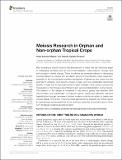Mostrar el registro sencillo del ítem
Meiosis Research in Orphan and Non-orphan Tropical Crops
| dc.creator | Bolaños Villegas, Pablo Alberto | |
| dc.creator | Argüello Miranda, Orlando | |
| dc.date.accessioned | 2019-03-07T14:50:52Z | |
| dc.date.available | 2019-03-07T14:50:52Z | |
| dc.date.issued | 2019-03-05 | |
| dc.identifier.citation | https://www.frontiersin.org/articles/10.3389/fpls.2019.00074/full | |
| dc.identifier.issn | 1664-462X | |
| dc.identifier.uri | https://hdl.handle.net/10669/76685 | |
| dc.description | Cooperación internacional e interdisciplinaria entre la Universidad de Costa Rica y The University of Texas Southwestern Medical Center. | es_ES |
| dc.description.abstract | Plant breeding is directly linked to the development of crops that can effectively adapt to challenging conditions such as soil nutrient depletion, water pollution, drought, and anthropogenic climate change. These conditions are extremely relevant in developing countries already burdened with population growth and unchecked urban expansion, especially in the tropical global southern hemisphere. Engineering new crops thus has potential to enhance food security, prevent hunger, and spur sustainable agricultural growth. A major tool for the improvement of plant varieties in this context could be the manipulation of homologous recombination and genome haploidization during meiosis. The isolation or the design of mutations in key meiotic genes may facilitate DNA recombination and transmission of important genes quickly and efficiently. Genome haploidization through centromeric histone mutants could be an option to create new crosses rapidly. This review covers technical approaches to engineer key meiotic genes in tropical crops as a blueprint for future work and examples of tropical crops in which such strategies could be applied are given. | es_ES |
| dc.description.sponsorship | Universidad de Costa Rica/[736-B6-602]/UCR/Costa Rica | es_ES |
| dc.description.sponsorship | Universidad de Costa Rica/[736-B5-A52]/UCR/Costa Rica | es_ES |
| dc.description.sponsorship | Universidad de Costa Rica/[814-B5-A49]/UCR/Costa Rica | es_ES |
| dc.description.sponsorship | Universidad de Costa Rica/[736-B7-801]/UCR/Costa Rica | es_ES |
| dc.language.iso | en_US | es_ES |
| dc.rights | Attribution-NonCommercial-NoDerivatives 4.0 Internacional | * |
| dc.rights.uri | http://creativecommons.org/licenses/by-nc-nd/4.0/ | * |
| dc.source | Frontiers in Plant Science, vol. 10, art.74, pp. 1-7 | es_ES |
| dc.subject | Meiosis | es_ES |
| dc.subject | Plant Breeding | es_ES |
| dc.subject | Genetic Diversity | es_ES |
| dc.subject | Tropical Agriculture | es_ES |
| dc.subject | Food Security | es_ES |
| dc.subject | Climate Change | es_ES |
| dc.subject | 551.6 Climatología y estado atmosférico | es_ES |
| dc.title | Meiosis Research in Orphan and Non-orphan Tropical Crops | es_ES |
| dc.type | artículo original | |
| dc.identifier.doi | 10.3389/fpls.2019.00074 | |
| dc.description.procedence | UCR::Vicerrectoría de Investigación::Unidades de Investigación::Ciencias Agroalimentarias::Estación Experimental Agrícola Fabio Baudrit Moreno (EEAFBM) | es_ES |
| dc.description.procedence | UCR::Vicerrectoría de Investigación::Unidades de Investigación::Ciencias Básicas::Jardín Botánico Lankester (JBL) | es_ES |
| dc.identifier.codproyecto | 736-B6-602 | |
| dc.identifier.codproyecto | 736-B5-A52 | |
| dc.identifier.codproyecto | 814-B5-A49 | |
| dc.identifier.codproyecto | 736-B7-801 |
Ficheros en el ítem
Este ítem aparece en la(s) siguiente(s) colección(ones)
-
Agronomía [1485]



